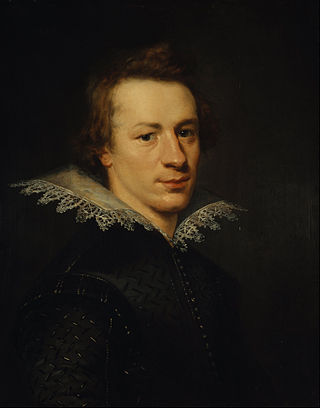Related Research Articles

Benjamin Jonson was an English playwright and poet. Jonson's artistry exerted a lasting influence on English poetry and stage comedy. He popularised the comedy of humours; he is best known for the satirical plays Every Man in His Humour (1598), Volpone, or The Fox, The Alchemist (1610) and Bartholomew Fair (1614) and for his lyric and epigrammatic poetry. He is regarded as "the second most important English dramatist, after William Shakespeare, during the reign of James I."
Richard Barnfield was an English poet. His relationship with William Shakespeare has long made him interesting to scholars. It has been suggested that he was the "rival poet" mentioned in Shakespeare's sonnets.

William Shakespeare (1564–1616) wrote sonnets on a variety of themes. When discussing or referring to Shakespeare's sonnets, it is almost always a reference to the 154 sonnets that were first published all together in a quarto in 1609. However, there are six additional sonnets that Shakespeare wrote and included in the plays Romeo and Juliet, Henry V and Love's Labour's Lost. There is also a partial sonnet found in the play Edward III.

William Aldis Wright, was an English writer and editor.
Francis Meres was an English churchman and author. His 1598 commonplace book includes the first critical account of poems and plays by Shakespeare.

William Drummond, called "of Hawthornden", was a Scottish poet.

Henry Wriothesley, Lord of Southampton, was the only son of Henry Wriothesley, 2nd Earl of Southampton, and Mary Browne, daughter of Anthony Browne, 1st Viscount Montagu. Shakespeare's two narrative poems, Venus and Adonis and The Rape of Lucrece, were dedicated to Southampton, who is frequently identified as the Fair Youth of Shakespeare's Sonnets.

Sir John Beaumont, 1st Baronet of Grace Dieu in the parish of Belton in Leicestershire, England, was a poet best known for his work Bosworth Field.

The Shakespeare apocrypha is a group of plays and poems that have sometimes been attributed to William Shakespeare, but whose attribution is questionable for various reasons. The issue is not to be confused with the debate on Shakespearean authorship, which questions the authorship of the works traditionally attributed to Shakespeare.

William Alabaster was an English Neo-Latin poet, playwright, and religious writer.

William Basse (c.1583–1653?) was an English poet. A follower of Edmund Spenser, he is now remembered principally for an elegy on Shakespeare. He is also noted for his "Angler's song", which was written for Izaak Walton, who included it in The Compleat Angler.

The Baconian theory of Shakespearean authorship contends that Sir Francis Bacon, philosopher, essayist and scientist, wrote the plays, which are publicly attributed to William Shakespeare. Various explanations are offered for this alleged subterfuge, most commonly that Bacon's rise to high office might have been hindered if it became known that he wrote plays for the public stage. The plays are credited to Shakespeare, who, supporters of the theory claim, was merely a front to shield the identity of Bacon. All but a few academic Shakespeare scholars reject the arguments for Bacon authorship, as well as those for all other alternative authors.

Sonnet 64 is one of 154 sonnets written by the English playwright and poet William Shakespeare. It is a member of the Fair Youth sequence, in which the poet expresses his love towards a young man.

Sonnet 144 was published in the Passionate Pilgrim (1599). Shortly before this, Francis Meres referred to Shakespeare's Sonnets in his handbook of Elizabethan poetry, Palladis Tamia, or Wit's Treasurie, published in 1598, which was frequently talked about in the literary centers of London taverns. Shakespeare's sonnets are mostly addressed to a young man, but the chief subject of Sonnet 127 through Sonnet 152 is the "dark lady". Several sonnets portray a conflicted relationship between the speaker, the "dark lady" and the young man. Sonnet 144 is one of the most prominent sonnets to address this conflict.

Sonnet 78 is one of 154 sonnets published by the English playwright and poet William Shakespeare in 1609. It is one of the Fair Youth sequence, and the first of the mini-sequence known as the Rival Poet sonnets, thought to be composed some time from 1598 to 1600.

William Shakespeare's influence extends from theater and literatures to present-day movies, Western philosophy, and the English language itself. William Shakespeare is widely regarded as the greatest writer in the history of the English language, and the world's pre-eminent dramatist. He transformed European theatre by expanding expectations about what could be accomplished through innovation in characterization, plot, language and genre. Shakespeare's writings have also impacted many notable novelists and poets over the years, including Herman Melville, Charles Dickens, and Maya Angelou, and continue to influence new authors even today. Shakespeare is the most quoted writer in the history of the English-speaking world after the various writers of the Bible; many of his quotations and neologisms have passed into everyday usage in English and other languages. According to Guinness Book of World Records Shakespeare remains the world’s best-selling playwright, with sales of his plays and poetry believed to have achieved in excess of four billion copies in the over 400 years since his death. He is also the third most translated author in history.

Sonnet 86 is one of 154 sonnets first published by the English playwright and poet William Shakespeare in the Quarto of 1609. It is the final poem of the Rival Poet group of the Fair Youth sonnets in which Shakespeare writes about an unnamed young man and a rival poet competing for the youth's favor. Though the exact date of its composition is unknown, it has been suggested that the Rival Poet series may have been written between 1598 and 1600.
Robert Tofte was an English translator and poet. He is known for his translations of Ariosto's Satires and his sonnet sequences Alba, The Months Minde of a Melancholy Lover (1598) and Laura, The Toyes of a Traveller: Or, The Feast of Fancie (1597). He also authored a partial translation of Boiardo's Orlando Innamorato and was possibly responsible for the popular and anonymous Batchelar's Banquet (1603) as well. Tofte is perhaps most famous for his incidental reference to Love's Labour's Lost in Alba, the first mention of that Shakespeare play in print.
Christopher Brooke was an English poet, lawyer and politician who sat in the House of Commons between 1604 and 1626.

The spelling of William Shakespeare's name has varied over time. It was not consistently spelled any single way during his lifetime, in manuscript or in printed form. After his death the name was spelled variously by editors of his work, and the spelling was not fixed until well into the 20th century.
References
- Attribution
 This article incorporates text from a publication now in the public domain : Lee, Sidney (1885). "Barret, Robert". In Stephen, Leslie (ed.). Dictionary of National Biography . Vol. 3. London: Smith, Elder & Co. pp. 279–280.; Endnotes:
This article incorporates text from a publication now in the public domain : Lee, Sidney (1885). "Barret, Robert". In Stephen, Leslie (ed.). Dictionary of National Biography . Vol. 3. London: Smith, Elder & Co. pp. 279–280.; Endnotes: - Corser's Collectanea, i. 193
- Chalmers's Edition of Shakespeare
- British Museum Catalogue